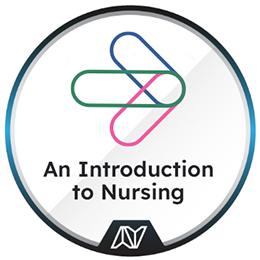
minutes average completion time
An Introduction to Nursing
In this micro course, we will introduce you to a career in nursing and the different roles and settings they are exposed to. We will also look at just a few of the exciting opportunities and careers that exist within nursing.
An introduction to nursing
All of us at some point in our lives are likely to encounter nurses, whether it is for a short-term accident or illness or later in life when we may need nursing care for long-term or chronic conditions.
Nurses can work in a broad range of roles and in a wide variety of settings. In order to be a nurse, individuals must be registered with the Nursing and Midwifery Council and have a degree in one of the four main branches of nursing:
- Adult Nurses
- Children’s Nurse
- Learning Disabilities Nurse
- Mental Health Nurse
Nurses can work in various settings including GP surgeries, hospitals, care homes, people’s own homes as well as specialist settings such as forensic units, prisons and hospice settings. Most nurses work as part of a multidisciplinary team, working alongside other professionals who are experts in their own field of study.
The role of a nurse usually involves working directly with patients to help them with a variety of physical, mental and social care needs. Each role is different and nurses look after people at every stage of life from looking after tiny premature babies to people in their last days of life.

Did you know?
Nurses complete (on average) a distance of 5k every time they do a 12-hour shift and that’s equivalent to 4 miles.
The 6 C’s of Care
All nurses work within the 6 C’s of care which are principles that they must follow to ensure they are working to uphold the best standards of care.
Care – the role of a nurse is to ensure care is provided exempt from bias or discrimination. We may need to care for someone whose values and beliefs are very different to our own so we must ensure we out them aside whilst at work.
Compassion – compassion is how care is given through relationships based on empathy, respect and dignity. We all deserve kindness and compassion in our lives but particularly when we are feeling unwell or worried
Competence – means those in caring roles must have the skills to understand an individual’s health and social needs. It is also about having the expertise, clinical and technical knowledge to deliver the highest standards of care and treatment based on solid research and evidence.
Communication – is an important part of successful caring relationships and fosters effective team working. Listening is as important as what we say. It is essential for ‘No decision about me, without me’.
Courage – enables us to do the right thing for the people we care for, to speak up when we have concerns about their health and wellbeing. It also means we have the personal strength and vision to innovate and to embrace new ways of working.
Commitment – those who care for others must commit to doing their best for those receiving care and ensuring they are working to the best of their ability.

Make a note
What does “Care” in the 6 C’s emphasize?
A. Providing a clean environment
B. Offering physical, emotional, and psychological support
C. Administering medication on time
D. Following hospital rules
Different branches of nursing
Adult nurses – work with anyone over the age of 18 and can work in a wide range of settings. Daily activities may include administering medication, writing care plans, taking observations, assessing patients in a range of settings with a wide variety of care needs.
Children’s nurse – Children have very specific health needs and you need to understand how a healthy child develops towards adulthood to minimise the impact of illness. This involves working closely with the parents or family members as well.
Communication is a consideration when nursing children. Adults can usually express their feelings and can tell you if they are in pain. A child may not be able to tell you this and the nurse needs to interpret and understand a child’s behavior and reactions. Children’s nurses need to be able to identify when a child’s health is deteriorating and act quickly.
A child’s care takes place in a range of settings including hospitals, day care centers, clinics and in the community such as child’s home.

Children’s nurses are part of multidisciplinary teams that look after patients under the age of 18. You will be at the center of teams that include doctors, hospital play staff, healthcare assistants, newborn hearing screeners, psychologists and social workers.
Learning disabilities nurse – looking after people who have learning disabilities requires a very specific set of skills. Communication is key when working with people who find communication difficult, and you will need to be able to adapt the way you communicate to ensure you understand what that person needs or wants from their care. You may need to advocate for them to ensure their care needs are met.
Mental health nurse – mental health nursing can be a rewarding yet challenging career. A warm personality and good communication skills are essential components of being a mental health nurse. You will need a good knowledge of mental health conditions and how to apply your knowledge in practice. You will need to display empathy and compassion with service users and their individual circumstances. This may include the social stigma of mental health problems which can make engaging with mental health services difficult for some people.

Did you know?
40% of Nurses don’t actually work in hospitals! They are commonly found in community in settings such as Care Homes and Hospices.
Top 10 nursing jobs in the UK
As of 2023 there are approximately 750,000
registered Nurses in the UK.
The Top 10 Nursing Jobs in the UK include the following:
1. Registered Nurse (RN)
Key Role: Providing patient care in hospitals, clinics, or care homes.
2. Advanced Nurse Practitioner (ANP)
Key Role: Conducting clinical assessments, diagnosing, and managing patient care independently.
3. Nurse Manager
Key Role: Overseeing nursing staff, managing budgets, and ensuring high-quality care delivery.
4. Nurse Educator/Lecturer
Key Role: Teaching and training nursing students at universities or hospitals.
5. Mental Health Nurse
Key Role: Supporting individuals with mental health issues, including inpatient and community care.
6. Nurse Consultant
Key Role: Specialising in areas like diabetes, oncology, or cardiology, offering advanced clinical expertise.
7. Paediatric Nurse
Key Role: Providing care to children and young people in hospitals, clinics, or the community.

8. District/Community Nurse
Key Role: Delivering care to patients in their homes or community settings.
9. Research Nurse
Key Role: Conducting clinical research to improve healthcare practices and treatments.
10. Critical Care/Intensive Care Nurse
Key Role: Providing care for patients in critical or life-threatening conditions in ICUs.

Pathways to becoming a Nurse
Click on the buttons below to find out about the different pathways you could take to becoming a Nurse…
Common Nursing Degree Pathways
BSc programmes accredited by the Nursing and Midwifery Council typical require 112-120 UCAS points from L3 qualifications such as T Level Health or Healthcare Sciences.
- Adult Nursing
- Paediatric Nursing
- Mental Health Nursing
- Learning Disabilities Nursing
*NHS Learning Support fund pays £5000 per year to train as a nurse.
NHS Apprenticeship Pathways for Nursing
- Dental Nursing (level 3)
- Maternity support worker (levels 2 and 3)
- Nursing associate apprenticeship (level 5)
- Registered nursing degree apprenticeship (level 6)
For more information about NHS apprenticeships visit the NHS website
Career Path Questionnaire
This simple questionnaire might help you to identify some career pathways that suit your personal interests and your skills. This questionnaire comes in 2 parts. The first part of this activity is a simple questionnaire.
Using the options in the table below, answer each of the questions by selecting a number in one of the columns, based on the following:
1 = Dislike a lot 2 = Dislike 3 = Don’t Mind 4 = Like 5 = Like a lot
Based on your personal interest and skills, you may be interested in the jobs shown in the highlighted section below.
The role of a care worker or activities worker
Roles explored in this course:
TBC.
You scored
in this category.
The role of a care home manager
Roles explored in this course:
TBC.
You scored
in this category.
Training to become a registered nurse
Roles explored in this course:
TBC.
You scored
in this category.
Check Your Knowledge
So now you’re well on the way to understanding about Nursing, answer the multi-choice questions below to see how much you really know.
Good luck!
Well done. You have successfully achieved the pass mark for this course. All the correct answers are now shown.
You haven’t achieved the pass mark on this occasion. Have another go.
You haven’t quite reached the pass mark for this course, but all of the correct answers are now shown. Please study these before moving on, or feel free to go back and look again at any of the pages of this course.

